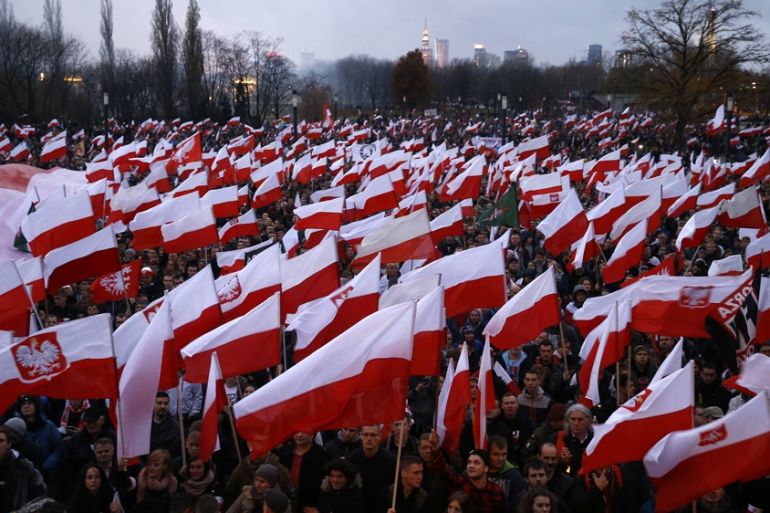Warsaw mayor bans far-right Independence Day march
Poland president calls for official state march along the same route that the far-right march was to take place.

An annual march organised by far-right groups in Poland to celebrate the country’s independence has been banned by Warsaw’s mayor over security concerns.
Hanna Gronkiewicz-Waltz said the event, which in previous years has attracted nationalists from all over the world, would not be allowed to go ahead.
Keep reading
list of 4 itemsGerman blue-chips warn of ‘extremist’ threat before EU elections
Germany’s Scholz calls for unity against far-right after MEP seriously hurt
‘No turning back’: Carnation Revolution divides Portugal again, 50 years on
“In June, I issued a letter to Minister [of Interior Joachim] Brudzinski, proposing to jointly secure the events organised in Warsaw on November 11. My letter was completely ignored,” Gronkiewicz-Waltz said during a press conference on Wednesday, adding that the city has “already suffered because of aggressive nationalism”.
The Independence March has been held annually since 2010. Last year, the event, attended by 60,000 people, sparked international outrage due to the presence of racist, homophobic and anti-immigrant slogans.
Chants included “The whole Poland sings with us: F*** off with the refugees”, “Not red, not rainbow but national Poland”, “One nation across the borders”, and “F*** Antifa”.
The Independence March association said the event will go ahead as planned on Sunday despite the ban.
“The Independence March will take place. The legal team of the Independence March association is currently preparing an appeal to the ban by Hanna Gronkiewicz-Waltz,” Tomasz Kalinowski, the group’s representative, wrote on Twitter on Wednesday.
Following the mayor’s decision, Poland’s President Andrzej Duda announced an official state march will take place on Sunday and will follow the same route as the planned Independence March.
A statement on the president’s website said the banning caused “an unnecessary escalation of emotions that could additionally affect the celebrations of regaining independence by Poland” and he, along with Prime Minister Mateusz Morawiecki, was putting on the alternate march as a show of unity.
“We cordially invited Polish women and men, all citizens and all groups to participate in the march,” he said.
![Thousands of people have attended the controversial march in previous years [Kacper Pempel/Reuters]](/wp-content/uploads/2018/11/3960b300d8244602a4f29fc20085d246_18.jpeg)
Last month, the European Parliament issued a resolution calling on member countries to take action against hate speech and neo-fascist violence in Europe.
The Independence March was cited as an example of this trend and Warsaw’s mayor Gronkiewicz-Waltz also referred to the lack of legal charges following the event.
“For a year, no indictment has been made regarding the events at the Independence March in 2017, although the prosecutor, which we know from the media, is in possession of expert opinion about the presence of banned ideologies at the Independence March,” she said.
Damian Kita, the March’s spokesman, told Al Jazeera on Tuesday that around 250,000 people were expected to attend the march, claiming that this year’s event would be peaceful.
“Because of this special anniversary, the 100th anniversary of regaining independence by Poland, we wanted to close this passing century under the slogan ‘God, honour, homeland’. We decided that no other slogan would better summarise the Polish fight for freedom,” Kita told Al Jazeera.